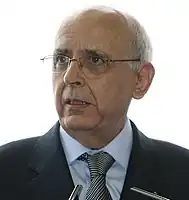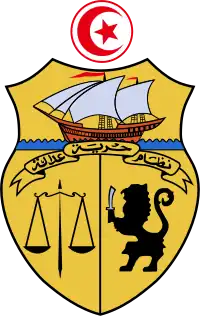Ghannouchi II Cabinet
During the Tunisian Revolution President Zine El Abidine Ben Ali fled Tunisia on 14 January 2011 Prime Minister Mohamed Ghannouchi then briefly took over as Acting President. On the morning of 15 January 2011 Ghannouchi had handed over the presidency to Speaker of the Chamber of Deputies Fouad Mebazaa, This was done after the head of Tunisia's Constitutional Council, Fethi Abdennadher declared that Ghannouchi did not have right to power and confirmed Fouad Mebazaa as Acting President under Article 57 of the 1959 Constitution. Ghannouchi returning to his previous position as prime minister was confirmed as prime minister by Mebazaa and formed a new national unity government on 17 January 2011 that included members of opposition parties, civil society representatives, and even a blogger who only a week previous had been imprisoned by the regime of the deposed President. On 27 February 2011 the government was dissolved and replaced by a new government led by Beji Caid Essebsi.
Ghannouchi II Cabinet | |
|---|---|
Cabinet of Tunisia | |
 | |
| Date formed | 17 January 2011 |
| Date dissolved | 27 February 2011 (1 month and 10 days) |
| People and organisations | |
| Head of state | Fouad Mebazaa (acting) |
| Head of government | Mohamed Ghannouchi |
| Total no. of members | 38 (incl. Prime Minister) |
| Member parties | RCD, Independents, UGTT (Labour Union), Ettakatol, Ettajdid, PDP, Pirate Party |
| Status in legislature | National unity government |
| History | |
| Election(s) | – |
| Predecessor | Ghannouchi I Cabinet (1999–2011) |
| Successor | Caid Essebsi Cabinet |
 |
|---|
|
|
Cabinet members
As of 17 January members included:[1]
| Office | Name | Party | |
|---|---|---|---|
| Prime Minister | Mohamed Ghannouchi | RCD | |
| Minister of Justice | Lazhar Karoui Chebbi | Independent | |
| Minister of Defence | Ridha Grira | RCD | |
| Minister of Foreign Affairs | Kamel Morjane | RCD | |
| Minister of Interior | Ahmed Friaa | RCD | |
| Minister of Religious Affairs | Laroussi Mizouri | Independent | |
| Minister of Regional and Local Development | Ahmed Najib Chebbi | PDP | |
| Minister of Higher Education and Scientific Research | Ahmed Brahim | Ettajdid | |
| Minister of Health | Mustapha Ben Jaafar | Ettakatol | |
| Minister of Commerce and Tourism | Mohamed Jegham | RCD | |
| Minister of Education | Taïeb Baccouche | Independent | |
| Minister of Social Affairs | Moncer Rouissi | RCD | |
| Minister of Agriculture and the Environment | Habib M'barek | RCD | |
| Minister of Planning and International Cooperation | Mohamed Nouri Jouini | Independent | |
| Minister of Industry and Technology | Afif Chelbi | Independent | |
| Minister of Finance | Ridha Chalghoum | RCD | |
| Minister of Culture | Moufida Tlatli | Independent | |
| Minister of Women's Affairs | Lilia Labidi | Independent | |
| Minister of Transport and Equipment | Slaheddine Malouche | RCD | |
| Minister of Training and Employment | Houssine Dimassi | UGTT | |
| Minister of Youth and Sports | Mohamed Aloulou | Independent | |
| Minister to the Prime Minister | Abdeljelil Bédoui | UGTT | |
| Minister in charge of Administrative Development | Zouheir M'dhaffer | RCD | |
| Secretary of State for Foreign Affairs | Ahmed Ounaies | Independent | |
| Secretary of State for Foreign Affairs | Radhouane Nouisser | Independent | |
| Secretary of State for Regional and Local Development | Néjib Karafi | Independent | |
| Secretary of State for Higher Education | Faouzia Charfi | Independent | |
| Secretary of State for Scientific Research | Refâat Chaâbouni | RCD | |
| Secretary of State for Health | Lamine Moulahi | Independent | |
| Secretary of State for Planning and International Cooperation | Abdelhamid Triki | RCD | |
| Secretary of State for Energy | Abdelaziz Rassâa | RCD | |
| Secretary of State for Communication Technologies | Sami Zaoui | Independent | |
| Secretary of State for Taxation | Moncef Bouden | RCD | |
| Secretary of State in charge of State Domains | Ahmed Adhoum | Independent | |
| Secretary of State for Tourism | Slim Chaker | Independent | |
| Secretary of State for Transport and Equipment | Anouar Ben Gueddour | UGTT | |
| Secretary of State for Agriculture and Environment | Salem Hamdi | Independent | |
| Secretary of State for Youth and Sports | Slim Amamou[lower-alpha 1] | Pirate Party | |
- The first time in the world that a Pirate Party member ascends to a governmental post.
Resignations
Ministers from the opposition
On 18 January 2011 the three ministers of the Tunisian General Labor Union (UGTT), Houssine Dimassi, Abdeljelil Bédoui and Anouar Ben Gueddour resign. The same day, Mustapha Ben Jaafar, from Ettakatol, also resigned. they all stated that they had "no confidence" in a government featuring members of the RCD.
RCD members
Following the various protests that followed after the formation of this government, Prime Minister Mohamed Ghannouchi and interim President Fouad Mebazaa announce that they are no longer members of the Democratic Constitutional Rally. On 20 January the other ministers still members of the RCD announced that they had done the same: they were Kamel Morjane, Ridha Grira, Ahmed Friaâ, Moncer Rouissi and Zouheir M'dhaffer. The same day M'Dhaffer a close confidant of Ben Ali in charge of Administrative Development also resigned from his ministerial functions. Kamel Morjane resigned from the government on 27 January a few hours before the government reshuffle.
Reshuffle of 27 January
Following protests against the presence of RCD members in important positions and the resignation of several ministers, the government was reshuffled on 27 January 2011. The UGTT decided not to participate but supported the new government.
Cabinet members
| Office | Name | Party | |
|---|---|---|---|
| Prime Minister | Mohamed Ghannouchi | Independent | |
| Minister of Defence | Abdelkrim Zbidi | Independent | |
| Minister of Foreign Affairs | Ahmed Ounaies | Independent | |
| Minister of Interior | Farhat Rajhi | Independent | |
| Minister of Justice | Lazhar Karoui Chebbi | Independent | |
| Minister of Religious Affairs | Laroussi Mizouri | Independent | |
| Minister of Regional and Local Development | Ahmed Najib Chebbi | PDP | |
| Minister of Education | Taïeb Baccouche | Independent | |
| Minister of Higher Education and Scientific Research | Ahmed Brahim | Ettajdid | |
| Minister of Health | Habiba Zéhi Ben Romdhane | Independent | |
| Minister of Commerce and Tourism | Mehdi Houas | Independent | |
| Minister of Social Affairs | Mohamed Ennaceur | Independent | |
| Minister of Agriculture and Environment | Mokhtar Jallali | Independent | |
| Minister of Planning and International Cooperation | Mohamed Nouri Jouini | Independent | |
| Minister of Industry and Technology | Afif Chelbi | Independent | |
| Minister of Justice | Jalloul Ayed | Independent | |
| Minister of Culture | Azedine Beschaouch | Independent | |
| Minister of Women's Affairs | Lilia Labidi | Independent | |
| Minister of Transport and Equipment | Yassine Brahim | Independent | |
| Minister of Training and Employment | Saïd Aïdi | Independent | |
| Minister of Youth and Sports | Mohamed Aloulou | Independent | |
| Minister in charge of Economic and Social Reforms and Coordination with the Ministries concerned | Elyès Jouini | Independent | |
| Secretary of State for Foreign Affairs | Radhouane Nouisser | Independent | |
| Secretary of State for Regional and Local Development | Néjib Karafi | Independent | |
| Secretary of State for Higher Education | Faouzia Charfi | Independent | |
| Secretary of State for Health | Refâat Chaâbouni | RCD | |
| Secretary of State for Health | Lamine Moulahi | Independent | |
| Secretary of State for Planning and International Cooperation | Abdelhamid Triki | RCD | |
| Secretary of State for Communication Technologies | Sami Zaoui | Independent | |
| Secretary of State in charge of State Domains | Ahmed Adhoum | Independent | |
| Secretary of State for Tourism | Slim Chaker | Independent | |
| Secretary of State for Agriculture and Environment | Salem Hamdi | Independent | |
| Secretary of State for Youth and Sports | Slim Amamou | Pirate Party | |
Other changes
On 10 February 2011 Ridha Belhaj is sworn in as Secretary of State to the Prime Minister. Foreign Minister Ahmed Ounaies resigns on 13 February 2011 following his remarks on the revolution, he had hailed Minister of Europe and Foreign Affairs of France Michèle Alliot-Marie as " friend of Tunisia", while the minister was summoned at the same time to explain herself in France for having offered the regime of Ben Ali the "know-how" of the French police to quell the protests when the repression was in full swing. he is replaced by Mouldi Kefi on 21 February 2011.
Resignation of the Prime Minister
Protests flared on 19 February, with 40,000 protesters demanding a new interim government completely free of association with the old regime, and a parliamentary system of government replacing the current presidential one. As a date was announced for an election in mid-July 2011, more than 100,000 protesters demanded the removal of Ghannouchi. On 27 February, following two days of demonstrations marked by violence in the capital in which five protesters were killed and twelve injured. Ghannouchi announced his resignation on state television, He stated that he had carried his responsibilities since Ben Ali fled, and "I am not ready to be the person who takes decisions that would end up causing casualties. This resignation will serve Tunisia, and the revolution and the future of Tunisia he added.
Following him the ministers Ahmed Néjib Chebbi, Ahmed Brahim, Elyès Jouini, Afif Chelbi and Mohamed Nouri Jouini notably announced their resignation.
Ghannouchi was replaced as Prime Minister the same day by Beji Caid Essebsi.